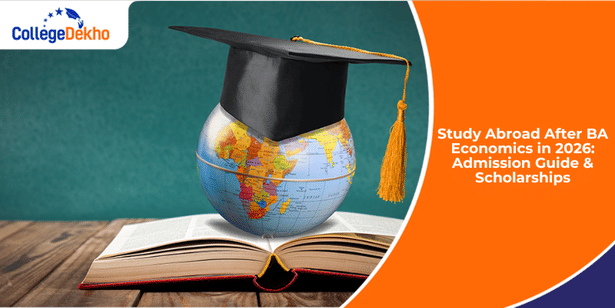
If you are planning to study abroad after BA Economics in 2026, there are quite a few formalities and requirements you need to complete before successfully enrolling in a university of your choice outside India. Today, pursuing higher education abroad has been made easier in many ways, but to make a seamless transition, you need to ensure all your credentials and other necessary documents are in order. You may apply for admission to relevant courses and institutes yourself or register with an agency to help you out during this process.
Also Read: Best Career Options after BA Economics
How to Study Abroad after BA Economics in 2026?
Check the detailed guide on how to study abroad after BA Economics in 2026 in the table below:
Stages | Steps | Details / Actions to Take |
|---|---|---|
Before Admission | 1. Identify your goals | Decide whether you want to pursue an MA/ MSc in Economics, Public Policy, Finance, or related fields. Research countries offering strong economics programs (USA, UK, Canada, Germany, Australia). |
2. Shortlist universities | Compare universities based on QS/ Times rankings, specialization, tuition fees, research facilities, faculty, and scholarships. | |
3. Check eligibility criteria | Ensure your BA Economics degree meets entry requirements — usually a minimum GPA of 3.0/4.0 or 60–65% in Indian terms. | |
4. Prepare for entrance exams | Take required tests: GRE (for US), IELTS/ TOEFL (for English proficiency), GMAT (if applying for management-related programs). | |
5. Gather academic documents | Collect transcripts, degree certificates, mark sheets, and letters of recommendation from professors. | |
6. Draft SOP and CV | Write a strong Statement of Purpose and academic CV highlighting research interests, achievements, and future goals. | |
7. Apply for scholarships | Explore options like Chevening (UK), DAAD (Germany), Fulbright (US), Erasmus Mundus (EU), or university-specific funding. | |
During Admission Process | 8. Submit applications | Apply via university portals or centralized systems (UCAS for the UK, DAAD for Germany, CommonApp for US grad schools). |
9. Attend interviews (if required) | Some top universities (like LSE or Oxford) may conduct interviews or written assessments. | |
10. Receive offer letters | Review conditional or unconditional offers and respond within the given deadline. | |
11. Apply for a student visa | Complete the visa application, pay SEVIS (US) or visa fees, and attend a visa interview if required. | |
After Admission | 12. Arrange finances | Pay tuition deposits, arrange education loans or scholarships, and open an international bank account. |
13. Book accommodation | Apply for university housing or private accommodation near campus. | |
14. Attend pre-departure sessions | Join orientation programs offered by universities or agencies for cultural and academic readiness. | |
15. Travel and settle abroad | Fly to your destination, complete university registration, and apply for a residence permit (if applicable). | |
16. Explore internships/research | During your course, engage in assistantships, internships, or research projects to strengthen employability. |
Scholarships to Study Abroad after BA Economics
You may also check out some of the scholarships available for you if you choose to study abroad after BA Economics:
Name of the Scholarship | Country / Region | Eligibility Criteria | Coverage / Benefits | Application Timeline |
|---|---|---|---|---|
Fulbright-Nehru Master’s Fellowship | USA | Indian citizens with a strong academic record (≥55% in bachelor’s), leadership qualities, and work/research experience. | Full tuition, living allowance, airfare, and health insurance. | Feb–June (previous year) |
Chevening Scholarship | UK | Bachelor’s degree, minimum 2 years’ work experience, and leadership potential. | Full tuition, living stipend, airfare, and visa costs. | Aug–Nov (previous year) |
Commonwealth Shared Scholarship | UK | From eligible Commonwealth countries, a strong academic background, and financial need. | Tuition fees, airfare, living allowance, thesis, and study travel grant. | Sep–Dec (previous year) |
Inlaks Shivdasani Foundation Scholarship | USA, UK, Europe | Indian citizens under 30, excellent academic records and admission to top-ranked universities. | Tuition up to USD 100,000 and living expenses. | Jan–Apr (year of admission) |
Erasmus Mundus Joint Master’s Scholarship | Europe (multiple universities) | Bachelor’s degree, good academic record, and English proficiency (IELTS/TOEFL). | Full tuition, monthly stipend (~€1,000), travel & installation costs. | Oct–Jan (year before start) |
DAAD EPOS Scholarship | Germany | Bachelor’s degree with ≥2 years’ experience in economics, development, or related field. | Full tuition (public universities often offer free), a monthly stipend, airfare, and health insurance. | Aug–Oct (previous year) |
Australia Awards Scholarship | Australia | Bachelor’s degree, academic excellence, leadership potential, and commitment to return to the home country. | Tuition, living expenses, airfare, health insurance, and establishment allowance. | Feb–Apr (previous year) |
Vanier Canada Graduate Scholarship (VCGS) | Canada | High academic excellence (first-class average), research proposal, and leadership ability. | CAD 50,000 per year for 3 years (PhD-level). | June–Nov (previous year) |
Rotary Global Grant Scholarship | Global (partner universities) | Bachelor’s degree, good academic record, commitment to humanitarian service, and study in focus areas like Economic Development. | Tuition, travel, living costs, and language training. | Rolling (depends on Rotary district) |
Aga Khan Foundation International Scholarship | Global (select countries) | Outstanding academic record, genuine financial need, and admission to reputable international universities. | 50% grant + 50% loan; covers tuition and living expenses. | Jan–Mar (year of study) |
Hopefully, this article will guide you substantially during your study abroad journey after BA Economics. Check the links below to learn more!
Related Links:
To get more information on study abroad and other colleges in India, contact us at 1800-572-9877 or post your questions in our QnA section to get in touch with our top academic counsellors!
FAQs
Foreign institutions often offer better ROI due to higher global exposure, advanced research opportunities, and international salaries, though costs and returns vary by country and university reputation.
Top institutes for Economics graduates include LSE, Oxford, Cambridge, Harvard, MIT, University of Toronto, ANU, LSE, NUS, and University of Amsterdam.
Yes, many scholarships like Fulbright, Chevening, DAAD, Erasmus Mundus, and Commonwealth Shared Scholarships support Economics graduates studying abroad by covering tuition, living, and travel expenses.
Visa requirements include a valid university offer letter, financial proof, language proficiency (IELTS/TOEFL), health insurance, passport, visa application form, and biometric verification.
Best courses after BA Economics abroad include MSc Economics, MA Development Studies, Master’s in Public Policy, International Relations, Finance, Data Analytics, and Business or Behavioral Economics.

















Similar Articles
List of CUET 2026 Subjects for BA Geography
List of CUET 2026 Subjects for BFA
CUET PG 2026 Art and Aesthetics Syllabus: Check Topics, Pattern, Download PDF
List of CUET 2026 Subjects for B.A. Political Science
List of CUET 2026 Subjects for BA Economics
GATE 2026 Syllabus for Psychology (XH - C4) - Important Chapters, Best Books, Sample Questions